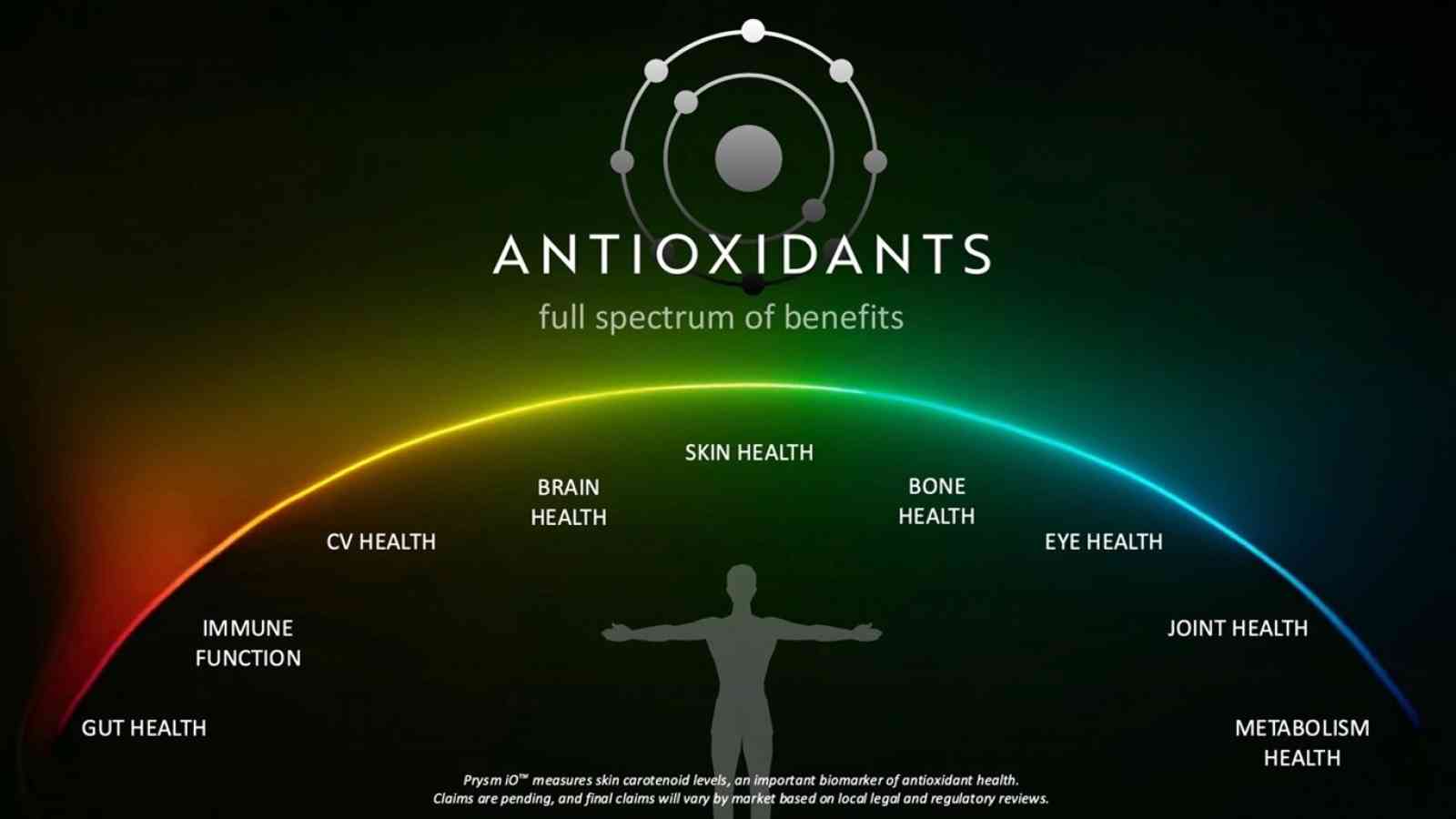
Your Tissue Antioxidant Level Accurately Measured in Just 15 Seconds!
Never before has it been so easy to discover whether the nutrients you ingest each day are adequate and actually getting into your tissues, so they can do their job!
After 20 years of research and development into Raman spectroscopy as a health screening tool by Nuskin Pharmanex, the global wellness and beauty organisation has shrunk this technology and made it available literally at your fingertips. Here at Genbiome, you can now conveniently touch their Prysm iO hyperspectral laser device, which non-invasively reads 200,000 data points in your skin in just 15 seconds, accurately measuring the amount of carotenoid antioxidants present in your tissues.
The Prysm iO hyperspectral absorptiometry device is not currently available for purchase in Australia until 2026, however our holistic health consultant, Dr Giselle Cooke, has been sent a device by Nuskin USA in advance for research purposes; Giselle is currently conducting a nutritional observational trial with an oncologist colleague at the Chris O’Brien Lifehouse, Sydney, using this technology to screen a cohort of his precancer patients.
But what is so special about carotenoids and why is it important to know if you are getting adequate amounts of these key nutrients from your diet?
Carotenes play crucial roles in many biological and biochemical processes, reducing oxidative stress in tissues, providing cellular protection against harmful insults, supporting immune protection, helping lipid metabolism and creating healthy vision. Carotenes exert pro-vitamin A activity, increasing the production of this essential vitamin, which is vital for regulating the expression of almost 700 genes, some of which protect against abnormal cell division and later cancer development.
More research is being published each year, linking carotene deficiency to a range of deteriorating health conditions and diseases, affecting mainly the eyes, skin and mucous membranes; more recently, as well, carotenoids have been discovered to play vital roles in maintaining the health of the brain, heart and circulation and to delay general ageing. “ It has been shown recently that low carotenoid levels, and especially decreased serum lycopene levels, are strongly predictive of all-cause mortality and poor outcomes of cardiovascular disease. “ (Petyaev)
There is good evidence for the benefits of dietary carotenoid intake and the prevention of atopic dermatitis and sunburn. Carotenoids modify allergic reactions and are often deficient in allergy sufferers and fussy young eaters.
Babies and infants can easily, quickly, painlessly, and safely have their carotenoid score tested on the Prysm iO, which provides important nutritional information for the treating practitioner.
Adequate carotene levels in the tissues of the eye protect against corneal damage from lack of tear production and dryness (xeropthalmia) and the commonest cause of blindness in elderly Australians, macular degeneration. Just one month ago a paper was published which explored the protective effects of carotenoids on the blood-brain barriers in patients with multiple sclerosis, which is an exciting new development offer some novel therapeutic hope for improving the health of people with this degenerative condition.
Key points about having non-invasive, safe and immediate carotenoid scanning are:
1) to assess your tissue antioxidant status and
2) to monitor your response to your nutritional/dietary intervention.
Take the opportunity to have an on-site, instant, nutritional antioxidant scan at Genbiome by booking a short appointment with Giselle, and she will also offer you holistic health advice relating to your result.
REFERENCES:
Concurrent validity of skin carotenoid status as a concentration biomarker of vegetable and fruit intake compared to multiple 24-h recalls and plasma carotenoid concentrations across one year: a cohort study, Jahns, L., Johnson, L.K., Conrad, Z. et al. Nutr J 18, 78 (2019). https://doi.org/10.1186/s12937-019-0500-0:78
Reduced Carotenoid and Retinoid Concentrations and Altered Lycopene Isomer Ratio in Plasma of Atopic Dermatitis Patients, Lucas, R.; Mihaly, J.; Lowe, G.M.; Graham, D.L.; Szklenar, M.; Szegedi, A.; Töröcsik, D.; Rühl, R. Nutrients 2018, 10, 1390
Carotenoids as neuroprotective agents in multiple sclerosis: Pathways, mechanisms, and clinical prospects, Elham Nadimi, Shirin Jamal Omidi, Mahshad Ghasemi, Mohammad Hashem Hashempur, Aida Iraji, Biomedicine & Pharmacotherapy, Volume 191, 2025,118496,ISSN 0753-3322,https://doi.org/10.1016/j.biop....
Lycopene Deficiency in Ageing and Cardiovascular Disease, Ivan M. Petyaev, Oxidative Medicine and Cellular Longevity, Volume 2016, Issue 1 3218605, 06 January 2016, https://doi.org/10.1155/2016/3218605
Ocular Carotenoid Status in Health and Disease, Lydia Sauer,Binxing Li,and Paul S.Bernstein, AnnualReviewofNutrition, https://doi.org/10.1146/annurev-nutr-082018-124555
A Systematic Review of Carotenoids in the Management of Age-Related Macular Degeneration. Antioxidants, Lem DW, Davey PG, Gierhart DL, Rosen RB. (Basel). 2021 Aug 5;10(8):1255. doi: 10.3390/antiox10081255. PMID: 34439503; PMCID: PMC8389280.
Macular degeneration: Macular pigment Raman detector for clinical applications Igor V. Ermakov, Maia R. Ermakova, Werner Gellermann, Paul S. Bernstein
Journal of Biomedical Optics, Vol. 9, Issue 1, (January 2004).
https://doi.org/10.1117/1.1627...
The Role of Retinoid Deficiency and Estrogens as Cofactors in Cervical Cancer, Patricio Gariglio , Jorge Gutiérrez, Enoc Cortés, Juan Vázquez, Archives of Medical Research
Volume 40, Issue 6, August 2009, Pages 449-465, (https://doi.org/10.1016/j.arcm... )
